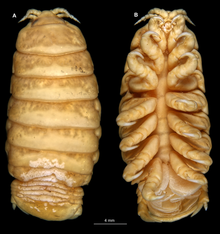Ceratothoa is a genus of isopod ectoparasites of teleost fish,[2][3] first described by James Dwight Dana in 1852.[1] Infection by Ceratothoa can cause anaemia, lesions, growth retardation, emaciation, and mortality in their fish hosts.[3]
| Ceratothoa | |
|---|---|

| |
| Scientific classification | |
| Domain: | Eukaryota |
| Kingdom: | Animalia |
| Phylum: | Arthropoda |
| Class: | Malacostraca |
| Order: | Isopoda |
| Family: | Cymothoidae |
| Genus: | Ceratothoa Dana, 1852 |
| Species | |
|
26 species (see text) | |
| Synonyms[1] | |
| |
Species
editCurrently, 26 valid species in this genus are recognized:[1]
- Ceratothoa africanae Hadfield, Bruce & Smit, 2014[4]
- Ceratothoa angulata (Richardson, 1910)
- Ceratothoa arimae (Nunomura, 2001)
- Ceratothoa banksii (Leach, 1818)
- Ceratothoa barracuda Martin, Bruce & Nowak, 2015
- Ceratothoa capri (Trilles, 1964)
- Ceratothoa carinata (Bianconi, 1869)
- Ceratothoa collaris Schiödte & Meinert, 1883
- Ceratothoa famosa Hadfield, Bruce & Smit, 2014[4]
- Ceratothoa gilberti (Richardson, 1904)
- Ceratothoa globulus Martin, Bruce & Nowak, 2015
- Ceratothoa gobii Schiödte & Meinert, 1883
- Ceratothoa guttata (Richardson, 1910)
- Ceratothoa imbricata (Fabricius, 1775)
- Ceratothoa italica Schiödte & Meinert, 1883
- Ceratothoa marisrubri Trilles, Colorni & Golani, 1999
- Ceratothoa oestroides (Risso, 1826)
- Ceratothoa oxyrrhynchaena Koelbel, 1878
- Ceratothoa parallela (Otto, 1828)
- Ceratothoa retusa (Schioedte & Meinert, 1883)
- Ceratothoa springbok Hadfield & Smit, 2020
- Ceratothoa steindachneri Koelbel, 1879
- Ceratothoa toyamaensis (Nunomura, 1993)
- Ceratothoa trigonocephala (Leach, 1818)
- Ceratothoa usacarangis (Avdeev, 1979)
- Ceratothoa verrucosa (Schioedte & Meinert, 1883)
C. carinata and C. oxyrrhynchaena were redescribed in 2013,[5] and C. angulata, C. capri, C. carinata, C. collaris, C. gilberti, C. gobii, C. guttata, C. italica, C. oestroides, and C. verrucosa in 2016.[6]
A number of taxa are species inquirendae:[1]
- Ceratothoa contracta (Miers, 1880)
- Ceratothoa deplanata Bovallius, 1885
- Ceratothoa gaudichaudii (H. Milne Edwards, 1840) (previously known as Ceratothoa rapax Heller, 1865)[7]
- Ceratothoa novaezelandiae Filhol, 1885
- Ceratothoa transversa (Richardson, 1901)
- Ceratothoa triglae Gourret, 1891
References
edit- ^ a b c d Schotte M, Boyko CB, Bruce NL, Poore GC, Taiti S, Wilson GD, eds. (2021). "Ceratothoa Dana, 1852". World Marine, Freshwater and Terrestrial Isopod Crustaceans database. World Register of Marine Species. Retrieved 2 September 2021.
- ^ Horton, Tammy (2000). "Ceratothoa steindachneri (Isopoda: Cymothoidae) new to British waters with a key to north-east Atlantic and Mediterranean Ceratothoa". Journal of the Marine Biological Association of the United Kingdom. 80 (6): 1041–1052. Bibcode:2000JMBUK..80.1041H. doi:10.1017/S0025315400003106. S2CID 83606126.
- ^ a b Horton, Tammy; Diamant, Arik; Galil, Bella (2004). "Ceratothoa steindachneri (Isopoda, Cymothoidae): An unusual record from the Mediterranean". Crustaceana. 77 (9): 1145–1148. doi:10.1163/1568540042900231.
- ^ a b Hadfield, Kerry; Bruce, Niel; Smit, Nico (2014). "Review of the fish parasitic genus Ceratothoa Dana, 1852 (Crustacea, Isopoda, Cymothoidae) from South Africa, including the description of two new species". ZooKeys (400): 1–42. doi:10.3897/zookeys.400.6878. PMC 4023241. PMID 24843254. S2CID 6067384.
- ^ Martin, Melissa B.; Bruce, Niel L.; Nowak, Barbara F. (2013). "Redescription of Ceratothoa carinata (Bianconi, 1869) and Ceratothoa oxyrrhynchaena Koelbel, 1878 (Crustacea: Isopoda: Cymothoidae), buccal-attaching fish parasites new to Australia". Zootaxa. 3683 (4): 395–410. doi:10.11646/zootaxa.3683.4.4. PMID 25250460.
- ^ Hadfield, Kerry A.; Bruce, Niel L.; Smit, Nico J. (2016). "Redescription of poorly known species of Ceratothoa Dana, 1852 (Crustacea, Isopoda, Cymothoidae), based on original type material". ZooKeys (592): 39–91. doi:10.3897/zookeys.592.8098. PMC 4926636. PMID 27408544.
- ^ Brusca, Richard C. (1981). "A monograph on the Isopoda Cymothoidae (Crustacea) of the eastern Pacific". Zoological Journal of the Linnean Society. 73 (2): 117–199. doi:10.1111/j.1096-3642.1981.tb01592.x.